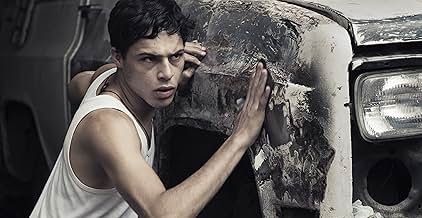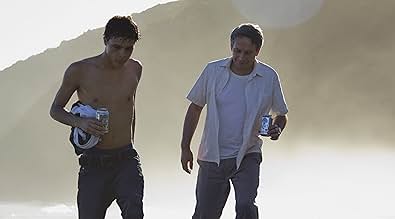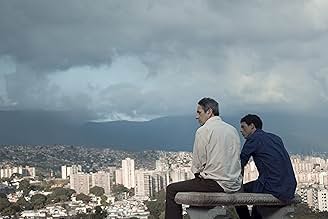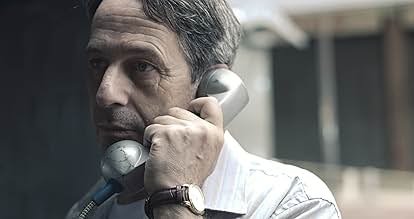IMDb RATING
6.6/10
4.2K
YOUR RATING
Armando, a 50 year man, seeks young men in Caracas and pays them just for company. One day he meets Elder, a 17 years boy that is the leader of a criminal gang, and that meeting changes thei... Read allArmando, a 50 year man, seeks young men in Caracas and pays them just for company. One day he meets Elder, a 17 years boy that is the leader of a criminal gang, and that meeting changes their lives forever.Armando, a 50 year man, seeks young men in Caracas and pays them just for company. One day he meets Elder, a 17 years boy that is the leader of a criminal gang, and that meeting changes their lives forever.
- Awards
- 11 wins & 26 nominations total
Featured reviews
'Desde Allá' (From Afar) slowly and carefully brings you into the world of Armando, a wealthy loner who spends his free time coercing Caracas street gang youths to go back to his apartment so he can enjoy their company while pleasuring himself. He finds Elder, another street youth, who he runs into trouble with at first, but eventually end up bonding to the point that their relationship becomes physical.
In terms of both Armando and Elder's chemistry, it's nothing to rave on about. Because they are such opposites, it's easy to see how they clash, but that's as far as it goes. It's more of a strange encounter because they are such different people, especially Elder, who starts off the film as being vehemently homophobic but oddly changes after some time with a very limited showing of affection and care.
The film, which recently won the Golden Lion at the Venice Film Festival, goes about its storytelling by long tracking shots or stationary frames that have a lot happening inside of them. Very little dialogue is exchanged, but looks and actions speak louder than words in this picture. While it keeps the suspense a bit on the up, others might want consistent dialogue, which this film doesn't have.
The film should be praised for several things: talking about a taboo subject in a country like Venezuela, and showing the issues that are happening in the country, which includes the long lineups for basic necessities and consistent criminal activity.
Without writing spoilers, what really makes this film is the ending. It's fairly open- ended, and it's a bit shocking to say the least. During the TIFF Q&A, Directory Lorenzo Vigas was rather inquisitive of the audience, trying to find out what they thought the ending was about. Not all films should provide the necessary answers for the viewer, but good films allow for interaction and further interpretation.
On a further note, this film was NOT selected by Venezuela as its Best Foreign Film selection for the upcoming Academy Awards. I'm not sure if this has to do with the topic. I haven't seen the actual selection 'Gone with the River' (Lo que lleva el río), so I can't comment. However, it seems odd that this film, which is showing at several world film festivals, and was in competition for the Golden Lion — and won — was NOT Venezuela's official selection.
In terms of both Armando and Elder's chemistry, it's nothing to rave on about. Because they are such opposites, it's easy to see how they clash, but that's as far as it goes. It's more of a strange encounter because they are such different people, especially Elder, who starts off the film as being vehemently homophobic but oddly changes after some time with a very limited showing of affection and care.
The film, which recently won the Golden Lion at the Venice Film Festival, goes about its storytelling by long tracking shots or stationary frames that have a lot happening inside of them. Very little dialogue is exchanged, but looks and actions speak louder than words in this picture. While it keeps the suspense a bit on the up, others might want consistent dialogue, which this film doesn't have.
The film should be praised for several things: talking about a taboo subject in a country like Venezuela, and showing the issues that are happening in the country, which includes the long lineups for basic necessities and consistent criminal activity.
Without writing spoilers, what really makes this film is the ending. It's fairly open- ended, and it's a bit shocking to say the least. During the TIFF Q&A, Directory Lorenzo Vigas was rather inquisitive of the audience, trying to find out what they thought the ending was about. Not all films should provide the necessary answers for the viewer, but good films allow for interaction and further interpretation.
On a further note, this film was NOT selected by Venezuela as its Best Foreign Film selection for the upcoming Academy Awards. I'm not sure if this has to do with the topic. I haven't seen the actual selection 'Gone with the River' (Lo que lleva el río), so I can't comment. However, it seems odd that this film, which is showing at several world film festivals, and was in competition for the Golden Lion — and won — was NOT Venezuela's official selection.
This is not a real review, it should be understood more as a collection of impressions on the film.
Very particular film that blends a strange but linear plot with a continuous sense of anxiety and inadequacy. A film that tries in a very bold way to tackle a very particular and very thorny theme and therefore very difficult to talk about without falling into being too terrible and therefore truly unwatchable. In the end the film is entertaining although really harsh and really strangely too bold but in the wrong way to really be considered one of those films that will remain in history. Not so good.
Very particular film that blends a strange but linear plot with a continuous sense of anxiety and inadequacy. A film that tries in a very bold way to tackle a very particular and very thorny theme and therefore very difficult to talk about without falling into being too terrible and therefore truly unwatchable. In the end the film is entertaining although really harsh and really strangely too bold but in the wrong way to really be considered one of those films that will remain in history. Not so good.
A film who I love. Maybe, for impecable Armando of Alfredo Castro. Or , because, as teacher, I know many Elders like the character of Luis Silva. It is not a comfortable film. But an useful one for atmosphere, high craft, for dialogue, reactions and the clash between two different worlds. And, more important, it is support for reflect about loneliness in contemporary world. Short, a great work. Simple, profound, stormy , cold and precise in each detail, giving more than it seems do.
I have seen this film twice; once a few years ago and now again recently. I am torn between giving it a good review or a not so good review and decided on the latter. The film in itself is well made, and Lorenzo Vigas clearly decided not to give it music, and in so doing avoids audience manipulation, and psychologically we are often left in the dark about the two protagonist's motivations. So far so good, and anyone who knows film history both Antonioni and Bresson come to mind. Here again I admire the film for its ambiguity and to confront a troubled relationship between a street hustler ( played excellently by Luis Silva ) and an older man played neutrally and well by Alfredo Castro. We are told very little in the film about the truth of both their pasts and this again I can go along with. A savage and brutal relationship develops between them, and their sexual contact is as hard as the physical violence between them. In the conventional sense there is no ' love ' between them, but a need bordering on dependence on the youth's side and darker motivations on the older man's side. The terrible ending is hard to watch, and in a way that I cannot understand the film seems to endorse the homophobia that it appears to attack. In no way is it a positive film about homosexuality, and this troubled me as it comes from a country that needs to understand homosexuality more than it does. However well made it is, it is so full of hatred towards others and the inner selves of the two main characters that I had to reach the conclusion that it is a negative, and repulsive film. The conclusion is a construct as all films are. A decision made by writers and a director and it offers absolutely no hope at all. It is my personal right to dislike this construct and turn my back on the film. It is not enough to make a film that is well made; but a film that is heartless and cruel in intent towards the natural state of homosexuality repulses me. Pessimistic in the extreme it serves no purpose in our troubled society.
An old-guy-meets-young-guy love story, er, hate story, perhaps. In their first encounter, Armando, the old one, promises money to Elder, the young one, in exchange for removing his clothes while he masturbates. Elder is a supposedly-straight homophobe who wails the older, gay man in the face, leaving him passed out on the floor while he steals his wallet. That's their first "date". Then they keep coming back to each other for more.
On the positive side, the acting is not half bad, especially from the young lead. He completely filled his character's shoes, right down to the body language. It didn't feel like he was acting at all. When he was supposed to be an asshole, he was a total asshole and then some. No matter how absurd the idea of his chemistry with Armando, his portrayal of unbridled passion was still shockingly convincing. The role of Armando does not require nearly as much acting by comparison. He mainly makes the same hollow face for the entire film, indicating that he just feels terrible all the time. There is nuance to both of the main characters which makes you simultaneously hate, pity, and maybe even root for them, capturing quite honestly at times the complexity of human nature and self-inflicted suffering.
All the while the characters are exploiting one another, there is never a single moment or conversation that indicates a genuine mutual interest or respect has developed between them. Suddenly, romance appears to blossom out of a couple of drinks, which I found highly unbelievable given the characters' demeanors. Armando doesn't smile even when, against all odds, he gets what he's been dreaming of. Their mere togetherness suggests perpetual self-loathing on behalf of both characters, as they ultimately can't seem to resist hurting each other.
An interesting change develops in one of the characters towards the latter part of the film, but then the story ends abrubtly and disappointingly. The lack of music in the end credits and the muted color palette perfectly exemplify the sense of emptiness one gets from the film in general.
I was hoping for and somewhat expecting a different outcome. The story's arc does not seem based in reality. The characters, Elder in particular, frequently seem guided by an unseen hand that makes them do things real people probably wouldn't do. The overall product manifests like an intoxicated, angry, revenge fantasy in which a homophobic man gets his comeuppance, but not before first being objectified and salivated over like he's a piece of meat. If you're not already bitter, you might want to avoid watching this cold-hearted film.
On the positive side, the acting is not half bad, especially from the young lead. He completely filled his character's shoes, right down to the body language. It didn't feel like he was acting at all. When he was supposed to be an asshole, he was a total asshole and then some. No matter how absurd the idea of his chemistry with Armando, his portrayal of unbridled passion was still shockingly convincing. The role of Armando does not require nearly as much acting by comparison. He mainly makes the same hollow face for the entire film, indicating that he just feels terrible all the time. There is nuance to both of the main characters which makes you simultaneously hate, pity, and maybe even root for them, capturing quite honestly at times the complexity of human nature and self-inflicted suffering.
All the while the characters are exploiting one another, there is never a single moment or conversation that indicates a genuine mutual interest or respect has developed between them. Suddenly, romance appears to blossom out of a couple of drinks, which I found highly unbelievable given the characters' demeanors. Armando doesn't smile even when, against all odds, he gets what he's been dreaming of. Their mere togetherness suggests perpetual self-loathing on behalf of both characters, as they ultimately can't seem to resist hurting each other.
An interesting change develops in one of the characters towards the latter part of the film, but then the story ends abrubtly and disappointingly. The lack of music in the end credits and the muted color palette perfectly exemplify the sense of emptiness one gets from the film in general.
I was hoping for and somewhat expecting a different outcome. The story's arc does not seem based in reality. The characters, Elder in particular, frequently seem guided by an unseen hand that makes them do things real people probably wouldn't do. The overall product manifests like an intoxicated, angry, revenge fantasy in which a homophobic man gets his comeuppance, but not before first being objectified and salivated over like he's a piece of meat. If you're not already bitter, you might want to avoid watching this cold-hearted film.
Representation: LGBTQIA+ Characters On-Screen
Representation: LGBTQIA+ Characters On-Screen
Celebrate the LGBTQIA+ characters that captured our imaginations in everything from heartfelt dramas to surreal sci-fi stories.
Did you know
- TriviaOfficial submission of Venezuela for the 'Best Foreign Language Film' category of the 89th Academy Awards in 2017.
- ConnectionsFeatured in CNN Íntimo: Alfredo Castro (2018)
- How long is From Afar?Powered by Alexa
Details
Box office
- Gross US & Canada
- $30,169
- Opening weekend US & Canada
- $5,136
- Jun 12, 2016
- Gross worldwide
- $150,443
- Runtime1 hour 33 minutes
- Color
- Sound mix
- Aspect ratio
- 2.66 : 1
Contribute to this page
Suggest an edit or add missing content

Top Gap
By what name was Les Amants de Caracas (2015) officially released in Canada in English?
Answer
![Watch Tráiler [OV]](https://m.media-amazon.com/images/M/MV5BMTdkOTYyMzctOTJmOC00YTE2LWFjNzAtYTdmYTVhN2M2MDVjXkEyXkFqcGdeQXRyYW5zY29kZS13b3JrZmxvdw@@._V1_QL75_UX500_CR0)





















